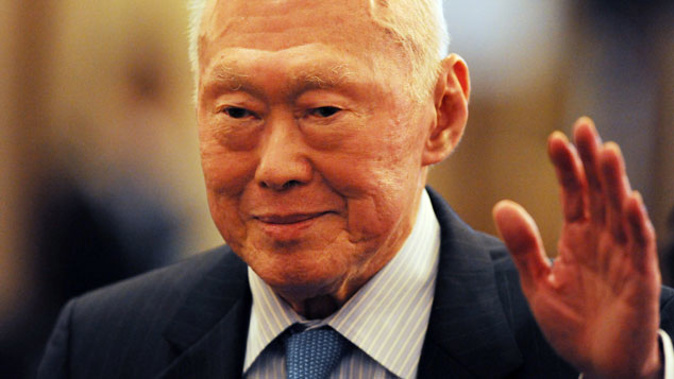
UPDATED 2.47PM: Lee Kuan Yew, Singapore's first prime minister and one of the towering figures of post-colonial Asian politics, has died - plunging the city-state he steered to prosperity into mourning.
Lee's eldest son, Prime Minister Lee Hsien Loong, said in a statement that he was "deeply grieved" to announce the passing of his 91-year-old father at the Singapore General Hospital.
He declared a seven-day period of national mourning before his father is cremated on March 29.
Lee's remains will first be taken to the Istana state complex for a two-day private family wake before lying in state at Parliament House for five days.
US President Barack Obama led world leaders in hailing the autocratic Lee.
"He was a true giant of history who will be remembered for generations to come as the father of modern Singapore and as one of the great strategists of Asian affairs," Obama said in a statement.
UN Secretary-General Ban Ki-moon's office also chimed in.
"Lee Kuan Yew was a legendary figure in Asia, widely respected for his strong leadership and statesmanship," a spokesman said.
Lee, whose health rapidly deteriorated after his wife died in 2010, was in hospital for nearly seven weeks with severe pneumonia.
Two years before he died, Lee revealed that he had signed a medical directive instructing doctors not to use any life-sustaining treatment if he could not be resuscitated.
He served as prime minister from 1959, when Britain granted Singapore self rule, to 1990. He led Singapore to independence in 1965 after a brief and stormy union with Malaysia.
Eugene Tan, associate professor of law at the Singapore Management University, said that Lee's death "certainly marks the end of an era", adding that "it raises the question of how Singapore is going to go from here".
The patriarch's passing is also likely to cast a pall over preparations for the city-state's 50th anniversary of independence on August 9.
On Lee's watch, Singapore became a sea trade, air transport and financial hub as well as a high-tech industrial centre, prospering despite its compact size and lack of basic natural resources.
"His success is in taking advantage of Singapore's natural assets ... its geography at the end of the Malay peninsula and on the end of the Malacca Strait," said Michael Barr, an associate professor of international relations at Flinders University who wrote a book on Lee's career.
Lee's counsel was often sought by Western leaders, particularly on China - which Lee identified early as a driver of world economic growth - as well as more volatile neighbours in Southeast Asia.
"Lee Kuan Yew gave Singapore an international profile completely disproportionate to the country's size," Singapore-based political analyst Derek da Cunha said.
But the British-trained lawyer was also criticised for jailing political opponents and driving his critics to self-imposed exile or financial ruin.
Singapore strictly controls freedom of speech and assembly and still uses corporal punishment for crimes such as spraying graffiti.
Phil Robertson, deputy Asia director of Human Rights Watch, acknowledged Lee's economic legacy but said "it also came at a significant cost for human rights", adding that younger Singaporeans are asking when greater political liberalisation can take place.
"Now that Lee Kuan Yew has passed from the scene, perhaps that long overdue conversation can finally proceed," he said.
Lee stepped down in 1990 in favour of his deputy, who in turn handed the reins to Lee Hsien Loong in 2004.
The People's Action Party (PAP), which was co-founded by the elder Lee, has won every election since 1959 and currently holds 80 of the 87 seats in parliament.
Lee rapidly began to look feeble after his wife of 63 years, Kwa Geok Choo, died in 2010. He retired from advisory roles in government in 2011 and has rarely appeared in public in the last two years.
In his last book, published in 2013, Lee looked back at his career and concluded: "I am not given to making sense out of life - or coming up with some grand narrative on it - other than to measure it by what you think you want to do in life.
"As for me, I have done what I had wanted to, to the best of my ability. I am satisfied."
Take your Radio, Podcasts and Music with you









